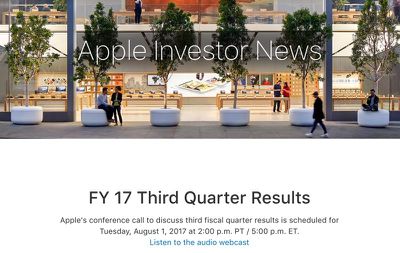Apple today updated its investor relations page to announce that the company will share its earnings for the third fiscal quarter (second calendar quarter) of 2017 on Tuesday, August 1.
The earnings release will provide a look at ongoing iPhone 7 and 7 Plus sales ahead of the iPhone 8, as well as early sales of the new iPad Pro and Mac models that were introduced at the Worldwide Developers Conference.

Apple's guidance for the third quarter of fiscal 2017 includes expected revenue of $43.5 to $45.5 billion and gross margin between 37.5 and 38.5 percent. At that range, Apple's Q3 2017 revenue will exceed Q3 2016 revenue, which was $42.4 billion, but gross margin may fall slightly.
The quarterly earnings statement will be released at 1:30 PM Pacific/4:30 PM Eastern, with a conference call to discuss the report taking place at 2:00 PM Pacific/5:00 PM Eastern. MacRumors will provide coverage of both the earnings release and conference call on August 1.




















Top Rated Comments
Apple -- like many companies -- has a provision for income taxes in the consolidated statement of operations. Operating income + other income - provision for income taxes = net income.
[doublepost=1499293636][/doublepost]No, it's not "baked into the price." The provision for income tax is a separate line item. But don't just take my word for it, go read their consolidated statement of operation ('https://www.apple.com/newsroom/pdfs/Q2FY17ConsolidatedFinancialStatements.pdf'). Gross margin does not include income tax, nor is income tax considered an operating expense.
Apple is setting aside 25% as a provision for income taxes.
The tax information is in the earnings release. That's actually the document that gets filed with the SEC. The conference call accompanies the earnings release, but isn't actually a requirement (it is expect from a company like Apple though).
Bladerunner2000 was simply inquiring about the tax information. That's part of the earnings release. He did not ask if the tax information was part of the conference call.
The call is not the official communication. The official communication is the earnings release. Sure, there is usually some additional insight provided in the call (otherwise there would be no point in conducting the call), but it's not a legal document. Of course, shareholders might get understandably upset by any misinformation in the call, but the analysts would probably pick up on any contradictory statements between the earnings release and what is uttered in the call.
If you want to supplement your understanding of Apple's business by reading call transcripts, by all means go ahead, but the document of record is the earning release.
Taxes aren't brought up in the conference call because it's a moot point. Apple sets aside 25-26% to provision for income taxes and there's really no discussion because that's what it will be. It's not up to Apple to make up tax rates. They file a return just like you and I and the government either approves it or doesn't approve it.
But just because taxes aren't mentioned in the typical conference call doesn't mean that Apple hasn't communicated it. They have and it's a crucial number because it affects net income.
Example 1: corporate income tax. Apple owes the government a percentage of their income.
Example 2: property tax. If Apple owns any real estate, it will receive a property tax bill from the respective authority. For Santa Clara County, that would be the County Tax Assessor's office.
Example 3: payroll tax. While it varies by jurisdiction, Apple is required to pay certain payroll taxes. This is not the tax withheld on employee paychecks. Apple probably puts this as an expense in their budget (employee salaries) but technically it's a tax.
Example 4: investment taxes. This is actually a line item in their consolidated statements of cash flow. Apple buys and sells marketable securities, so they are required to pay capital gains taxes.
There are probably more examples for Apple.
Note that at least in California, sales tax collected would not be reported as revenue.
Apple's most recent tax rate was 25.5% according to their quarterly earnings press release ('https://www.apple.com/newsroom/2017/05/apple-reports-second-quarter-results/').
Have you guys ever looked at a corporate earnings statement? Not just from Apple, but from any publicly trade company?
The provision for income taxes is taken out before net income is reported. Again, go look at their consolidated statement of operations ('https://www.apple.com/newsroom/pdfs/Q2FY17ConsolidatedFinancialStatements.pdf'). It's right there. Earnings per share (EPS) is calculated from net income (after income tax provision).
It's not like Apple says at a conference call, "here's what we earned" then come back later and say "oops, sorry, it was actually less because we just paid taxes." That tends to upset shareholders.
Apple doesn't post their consolidated financial statements for giggles. AS A PUBLICLY TRADED COMPANY THEY ARE REQUIRED BY LAW TO DO SO. It provides some basic information to potential and current investors about what the company does to make money, how much it makes and how it spends its money.
Sometimes the news is good, sometimes it's bad, but investors have a basic right to know.